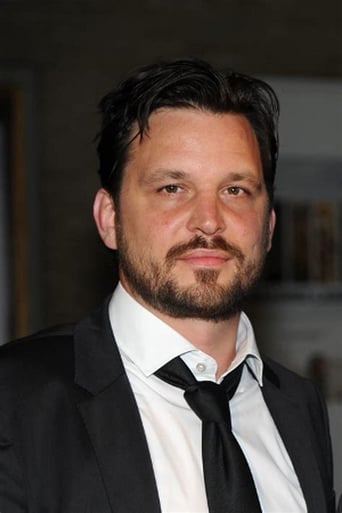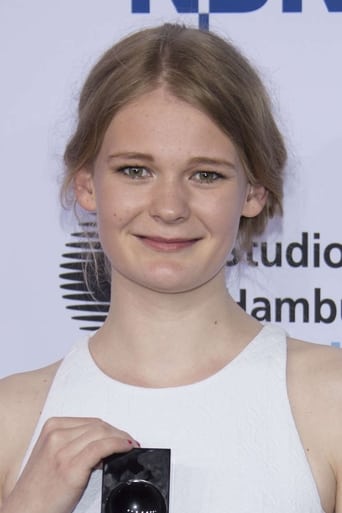ada
the leading man is my tpye
Brightlyme
i know i wasted 90 mins of my life.
Pacionsbo
Absolutely Fantastic
Maidexpl
Entertaining from beginning to end, it maintains the spirit of the franchise while establishing it's own seal with a fun cast
Sankari_Suomi
If you've never seen a Katrin Gebbe movie before, this is the one you should start with. Strong performances by Julius Feldmeier and Torben Lohmann drive a powerful 'coming of age' story that expertly blends the themes of faith, love, and hope. Fans of Sascha Alexander Gersak will also be well rewarded, despite an unflattering colour palette.I rate Tore Tanzt at 26.64 on the Haglee Scale, which works out as a very respectable 8/10 on IMDB.
leatherpress
The slowly unwinding pace of this film can seduce one into a believing not much is happening, but from the outset there's a sinister feel to this film that becomes far more visceral, and disturbing. At times the violence was so calculating and casual it made me physically ill, and wanted to walk away from it. That said, the behavior of the parents, who fed into each others 'evil', reflected for me the explicit desire to dehumanize that which they hate. A feature so evident in the early 21st century. It's not from a genuine failure to reach and understand another's vulnerability, and Tore's is achingly portrayed in this film, painfully so, and the adults ever so casually seek to obliterate it. A day before I'd seen Reggie Yates doco on the experience of the LGBTI community in St Petersberg, and was truly frightened by the casual nature of the brutality, intimidation and violence of 'ordinary' Russians to gay people. The banality of evil indeed.
Horst in Translation (filmreviews@web.de)
Tore's dancing and Benno's prancing in "Tore tanzt", the first full feature movie by writer and director Katrin Gebbe. This is a 2013 release, so it will have it 5th anniversary next year. The young actor who plays the title character is Julius Feldmeier and there is a reason why he did not really receive a great deal of awards attention while his film did. He is a good casting choice for the part of a modern Jesus on his very own modern Way of the Cross, but there is nothing about his performance that stands out. The MVP in this 110-minute movie is certainly Sascha Alexander Gersak. I may be a bit biased as I like him a lot as an actor in other projects too, but there is no denying how he is the (evil) heart and soul of the film, a man playing a sadistic family dad who seems to be Tore's big test when it comes to his faith and devotion to God. Yes there are scenes when this movie sacrifices a bit of realism in his attempt to be memorable through shock value, but it's fine I guess and once again Gersak is the one who needs to be thanked for making even these moments work.But enough talk about Gersak. Another thing that makes this film an interesting watch are the references about a real case. Of course, a lot of it was added for dramatic purposes, but that's fine as after all we are not watching a documentary, but a work of fiction here. The cast does not include too many known names, but I personally felt this wasn't a problem. Sure better acting would have made this an even more rewarding watch, but lets be honest here, this film is really mostly about the story and how strange and absurd, yet reality-based, it all is. I personally also see Tore as a bit of an antagonist here, or at least a very insane person if he goes through all of this on purpose and still will not contact the police or anything. Anyway, I must say I am quite shocked by the contents here. This is definitely not an easy film to stomach and (just like me) you will not expect what is hidden behind this so harmless, almost playful title. I mean the German title of course, the English title "Nothing Bad Can Happen" has a great deal of irony attached to it eventually. So yeah, I think this was a decent film overall, even if it has weaknesses. It's certainly closer to a ** out of ***** than to a **** out of *****, but I still recommend the watch.
davidkhardman
This extraordinary feature film debut by director Katrin Gebbe is one of the most uncompromising examinations of evil that I have ever seen. In fact, "evil" may not even be the right word to use here, because it is a word that tends to be used as an explanation in its own right, a word that pathologises individuals and prevents us from considering the social contexts within which disturbing behaviour can arise. By contrast, Nothing Bad Can Happen – whilst not providing the audience with any pat answers – places a particular set of events under a spotlight and forces us to consider some difficult questions.The story begins with a group of Jesus Freaks, young people who blend Christianity and punk rock. Among them is Tore, whose blond locks and blue eyes imbue him with a truly angelic appearance. Whilst driving home from Tore's baptism, the Jesus Freaks encounter Benno, whose pickup truck won't start. They gather round and pray over the bonnet of his vehicle, after which the engine kicks into life. Benno asks about their group and later turns up at one of their punk gatherings, where he witnesses Tore having an epileptic seizure. He takes Tore to his family's summer dwelling, a small shack on an allotment. Tore is invited to stay with the family – consisting of Benno's partner Astrid and her two children from a previous relationship, Dennis and Sanny. As there is not enough room in the hut, Tore sleeps in a tent.Although he is gently questioning of Tore's Christianity, suggesting that religion is for those who cannot handle responsibility for their own lives, Benno is initially charming. But little by little a darker side is revealed. At a barbecue, Benno jokingly jabs a pair of tongs towards Tore's face. During a gathering for Sanny's fifteenth birthday, Benno punches Tore, but then apologises for what he says is uncharacteristic behaviour. However, Benno's abuse then becomes even more serious.Throughout it all, Tore shows no inclination to leave of his own accord nor to fight back (earlier in the film one of the other Jesus Freaks makes a speech about turning the other cheek). He interprets his situation as a test set by God, although later – after a spell in hospital – he feels that God has abandoned him. Should we admire Tore's religiosity or is he hopelessly naive? Are Benno, Astrid, and the children the closest thing that Tore has to a real family, or is he simply unable to take responsibility for his own life, as Benno originally suggested? But whatever we think about Tore, the treatment he receives is truly awful.Water appears recurrently at significant moments in the film. Tore is baptised in the sea; there is a near-sexual encounter in a swimming pool; an episode of animal abuse involves water; and at one point Tom – filthy and stinking – is hosed down by Benno, only Sanny takes the hose and makes a game of it. At various points the music rumbles and gurgles, like a large object sinking into deep water.**SIGNIFICANT SPOILERS FROM THIS POINT ONWARDS**Disturbingly, Astrid goes from being a mere observer of Tore's suffering to being actively complicit in its cause. She and Benno occasionally appear surprised, appalled even, by their own behaviour, but then go on to perpetrate worse. Likewise, Dieter and Cora are occasional visitors who begin by expressing concern for Tore, but end up also participating in his suffering. I'm sure I could not have been the only audience member thinking of real-life cases such as Fred and Rosemary West (and, in fact, Nothing Bad Can Happen is based on true events in Germany). But moreover, watching ordinary people become involved in horrific events brings to mind the rise of the Nazis, not to mention more recent events such as Abu-Ghraib.At the end of the film Tore is badly beaten and mutilated, and Benno, Astrid, Dieter and Cora wrap him in a blanket and drive him out to the country. Here, Benno drops the blood-soaked young man in a copse. Benno asks him where his God is now, to which Tore raises a hand to his chest and whispers "Here". Apparently unable to cope with this demonstration of faith, Benno kicks Tore, whose body rolls down a slope and – the opposing bookend to the baptism at the beginning – comes to a rest in water with plant matter wreathed Christ-like around his head.Back at the allotment, Sanny and Dennis manage to escape and the final shot is of them walking hand-in-hand down the road. When the final credits appear, instead of scrolling upwards in the conventional manner, they scroll downwards leaving us with the feeling of a descent into hell.Director Katrin Gebbe has stated that, following a showing at Cannes, the film "had boos and cheers, escapees and long standing ovations". I cannot for the life of me think why anyone would boo this movie. Certainly, the events it depicts are shocking in the extreme and Gebbe refuses to make moral judgments on behalf of the audience. Nor is there much that can be considered uplifting, unless you feel that Tore's refusal to fight back is inspirational rather than naive. But surely these aspects are characteristic of a mature work of art that refuses to patronise its audience? In any event, although this is not an easy watch (I occasionally found myself curling my fists as I squirmed in discomfort) I consider that this is one of the stand-out movies of the year so far, underpinned by a strong script, strong direction, fine music and cinematography, and with a memorable performance by Julius Feldmeier as Tore.




